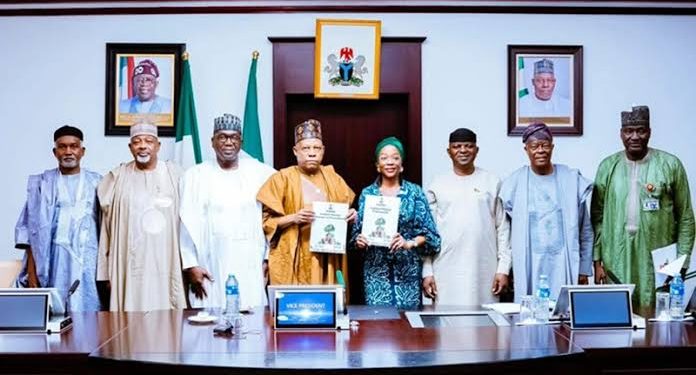Nigeria has unveiled an ambitious plan to attract up to $3 billion annually in climate finance through its National Carbon Market Framework and Climate Change Fund, reinforcing its position as a leader in sustainable and nature-positive investments across the Global South.
Vice President Kashim Shettima announced the initiative during the “Climate and Nature: Forests and Oceans” session at the ongoing United Nations Climate Change Conference (COP30) in Belem, Brazil. Representing President Bola Ahmed Tinubu, Shettima said the plan reflects Nigeria’s commitment to balancing environmental sustainability with economic development and resilience.
He explained that the funds will be reinvested in community-led projects such as reforestation, blue carbon initiatives, and sustainable agriculture designed to create jobs and empower local communities. “Through our National Carbon Market Framework and Climate Change Fund, we aim to mobilise up to three billion US dollars annually in climate finance,” Shettima said. “These resources will be reinvested in community-led reforestation, blue carbon projects, and sustainable agriculture.”
Shettima urged the global community to increase grant-based climate financing and support mechanisms such as debt-for-nature swaps and blue carbon markets under the Paris Agreement. He stressed that forests, oceans, and landscapes are shared global assets that require predictable and equitable funding. “Countries that have benefited more from centuries of extraction must now lead in restoration,” he added.
The Vice President highlighted ongoing domestic initiatives driven by Nigeria’s Climate Change Act of 2021, which legally binds the government to adopt nature-based solutions. These include the Great Green Wall Initiative, which has planted over 10 million trees across 11 northern states and created thousands of green jobs; the Forest Landscape Restoration Plan, targeting 2 million hectares of land restoration by 2030; and the Marine and Blue Economy Policy, aimed at promoting climate-smart fisheries and coastal protection.
He reaffirmed that Nigeria is “taking bold, coordinated steps to restore balance between climate, nature, and development,” through the institutional backing of the National Council on Climate Change.
Shettima also rejected the view of Africa as a passive victim of climate change, describing the continent as a powerhouse of potential. “Africa’s rainforests, mangroves, peatlands, and oceans are global assets. Our young people are the world’s greatest untapped source of innovation and resolve,” he said.
He called for collaboration with global partners and the African Union to advance the African Nature Finance Framework, aimed at unlocking private capital for reforestation, ecosystem restoration, and blue economy development across the continent. “COP30 must mark the beginning of a new compact, one that recognises Africa’s ecosystems as global assets deserving of global investment and protection,” he concluded.
Earlier this year, President Tinubu announced that Nigeria’s Carbon Market Activation Policy was expected to unlock up to $2.5 billion in carbon credit investments by 2030. The policy aligns with the country’s commitment to update its Nationally Determined Contributions by 2025 under the UN Framework Convention on Climate Change.
Tinubu also disclosed plans to establish a Global Climate Change Investment Fund to blend public and private capital, de-risk green infrastructure, and scale clean energy projects.
For small and medium enterprises (SMEs), these developments open pathways for participation in emerging green industries, from carbon farming and renewable energy ventures to sustainable agribusiness. With the right support, Nigerian entrepreneurs could become key players in the nation’s transition toward a low-carbon, climate-resilient economy.










